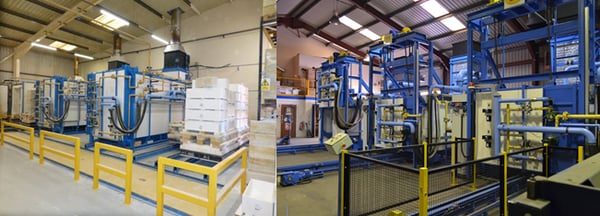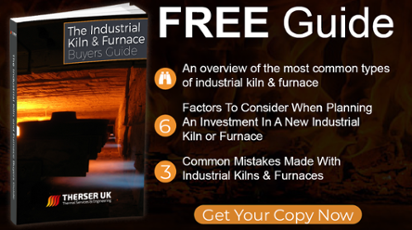Share this
Case Study: Our Unique MMC (Multi-Zone Multi-Mode Combustion) System
by Therser Sales Team on 06-Jul-2017 07:22:30

MMC is an Advanced Combustion Control System conceived and designed by engineers at Therser to enhance the performance of Gas Fired, Industrial Intermittent Kilns. Unlike other Kiln Combustion Control Systems, where the control philosophy is fixed at the Kiln design stage; MMC uniquely combines multiple combustion control modes in to one Flexible and Advanced Combustion Control Package capable of independently controlling multiple Temperature Control Zones.
Whilst multiple different combustion control modes can be incorporated into one powerful MMC Control System; typically, the control modes shown opposite (fig 1) are usually sufficient for the optimum firing of most products. Control modes types can be programmed in to the firing cycle in any order and sequence. Switching between each control mode is fully automatic and “bumpless”.
| Fig 1. Typical MMC Combustion Control Modes: | ||
| Mode # | Primary Mode: | Secondary Mode |
| 1 | High / Low with Ratio Control | Excess Air with bias Control |
| 2 | Fixed Air with Modulating Gas | --- |
| 3 | Pulse Firing with Ratio Control | Excess Air with bias Control |
| 4 | Modulating On-Ratio control | Excess Air with bias Control |
Utilisation of MMC On A New Kiln For A UK Aerospace Manufacturing Company
The demand for newer more efficient and eco-friendly commercial jet engines, together with the introduction of new environmental regulations forcing airline operators to retire and replace older operationally inefficient aircraft, has spurred a rapid and sustained growth in the aerospace industry and especially in the production of commercial jet engines.
The manufacture of a modern commercial jet engine is complex, requiring many high-performance precision cast parts in which the internal section of the casting can only be precisely formed using a Preformed Ceramic Core; for example, in the casting of turbine blades. To eliminate damage and distortion during sintering / firing, large ceramic cores are normally supported using a profiled setter, whilst smaller, more detailed precision ceramic cores are normally supported in a powder in refractory “saggers” (boxes).
Preformed ceramic cores with complex and delicate shapes, typical of those used for high performance precision cast parts require de-binding and sintering in a kiln that will heat treat the product over several days.
Most traditional gas fired kilns will not be able to perform and maintain the complex and demanding firing parameters required by core manufactures unless fitted with Therser’s unique MMC system.
%20System.jpg?width=790&height=593&name=Case%20Study%20-%20Utilisation%20of%20Therser%20UK%E2%80%99s%20Unique%20MMC%20(Multi-Zone%20Multi-Mode%20Combustion)%20System.jpg) Fig 2
Fig 2
Field Trials – Challenges:
Relatively Dense Set Kiln Car Loading Pattern (fig 2).
Densely set loading patterns, especially product contained in refractory saggers can be difficult to heat uniformly at the same heating rates resulting in large temperature differentials across the saggers causing product deformation, thermal stress cracks and loss of ware.
The combustion control system must be capable of:
- Very long and close temperature tolerances in early pre-heat portion of the firing cycle for products fired in saggers supported in granular (30 hours to 600 ºC):
- The Combustion Control System must be capable of precise “Low Temperature Hold Control” over long periods whilst maintaining minimal deviation, effective turbulence, high mass flow and uniform heat transfer to the product, as well as controlling oxygen levels.
- Binder Removal
- Dimensional Stability
- Pre-Formed Ceramic Cores
Results
- MMC Programming and Code for Bumpless Switching between different Firing Modes was satisfactory achieved.
- Control System and Device Communications interface and Control was effective.
- “Low Temperature Hold Control and Slow Ramp Rates” were effective and drift / deviation was not experienced
- The technology has now been applied to several UK ceramic core manufacturers. They have increased product yield. This led to some existing kilns being converted to Therser’s MMC system and also to an additional investment in two new kilns to increase capacity.
- Yield and productivity benefits from the technology are now being applied to help new and existing ceramic manufacturing customers in tableware, sanitaryware and heavy clay.


Share this
- Company News (90)
- Battery Materials (41)
- kiln (37)
- fabrication (29)
- Alloy (27)
- Furnace (27)
- Welding (16)
- Industrial Kilns (15)
- Battery (13)
- Ceramic Kilns (13)
- Processes (13)
- alloy fabrication (13)
- Shuttle Kilns (12)
- RTO’s (11)
- Vacancies (11)
- Hydrogen (10)
- Therser UK (9)
- Tunnel Kiln (9)
- Refractory (8)
- Therser (8)
- Wellman Furnaces (8)
- Brickwork (7)
- Case Studies (7)
- Afterburners (6)
- Fibre Lining (6)
- electric (6)
- Almor Wellman (5)
- thermal engineers (5)
- Biochar (4)
- Exhibition (4)
- Pyrolysis (4)
- Servicing (4)
- Spares (4)
- heat treatment (4)
- History (3)
- Ceramics Uk (2)
- Combustion Control Upgrades (2)
- Nitrogen (2)
- Temperature Control Rings (2)
- gas (2)
- Certificates (1)
- Instrumentation (1)
- MMC (1)
- RHK (1)
- Roller Hearth Kiln (1)
- Test Trials (1)
- aerospace (1)
- analyser (1)
- elec (1)
- oxygen (1)
- vans (1)
- September 2025 (2)
- May 2025 (2)
- March 2025 (1)
- February 2025 (2)
- January 2025 (5)
- December 2024 (5)
- November 2024 (7)
- October 2024 (5)
- September 2024 (4)
- August 2024 (14)
- July 2024 (13)
- June 2024 (2)
- May 2024 (5)
- April 2024 (13)
- March 2024 (8)
- February 2024 (12)
- January 2024 (14)
- December 2023 (6)
- November 2023 (12)
- October 2023 (24)
- September 2023 (11)
- August 2023 (11)
- July 2023 (9)
- June 2023 (15)
- May 2023 (53)
- April 2023 (5)
- March 2023 (6)
- February 2023 (7)
- January 2023 (3)
- December 2022 (8)
- November 2022 (5)
- October 2022 (11)
- September 2022 (1)
- August 2022 (2)
- July 2022 (1)
- June 2022 (2)
- May 2022 (1)
- March 2022 (1)
- February 2022 (1)
- January 2022 (1)
- December 2021 (3)
- October 2021 (1)
- August 2021 (1)
- June 2021 (1)
- May 2021 (4)
- April 2021 (2)
- March 2021 (4)
- February 2021 (2)
- December 2020 (3)
- November 2020 (1)
- September 2020 (3)
- May 2020 (1)
- April 2020 (2)
- March 2020 (1)
- January 2020 (1)
- December 2019 (1)
- July 2019 (2)
- June 2019 (1)
- April 2019 (2)
- March 2019 (3)
- February 2019 (4)
- December 2018 (1)
- November 2018 (1)
- September 2018 (2)
- August 2018 (1)
- July 2018 (1)
- May 2018 (3)
- April 2018 (1)
- February 2018 (3)
- January 2018 (2)
- December 2017 (3)
- November 2017 (1)
- October 2017 (2)
- September 2017 (4)
- August 2017 (1)
- July 2017 (2)
- June 2017 (2)
- May 2017 (3)
- April 2017 (3)


